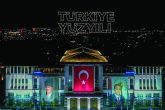Türkiye is currently commemorating the centenary of the proclamation of the Republican regime. After signing the Lausanne Peace Treaty with the victorious powers of the First World War on July 24, 1923, the Turkish state changed the regime from monarchy to republic. Therefore, although it was designed as a new state by transforming its capital city from the imperial İstanbul to Ankara, the Republic of Türkiye is the successor state of the Ottoman Empire. Most state institutions such as the Council of the State (Danıştay) and the Turkish Police Service (Türk Polis Teşkilatı), both established in the second half of the 19th century, are inherited from the Ottomans.
The establishment of the Republican regime as a continuation of the Ottoman Empire, a global power extending over three continents, can be compared with the birth of a phoenix out of its ashes. According to the Greek and Egyptian mythology, the phoenix is a bird that throws itself into fire after living for centuries and is reborn from its ashes. It is believed that the main reason for this suicidal act is the distress caused by living in the same pattern for a long time, since it desires to return as a different bird from the ashes. Similarly, many historians and political scientists consider the entry of the Ottoman Empire into the First World War as a suicidal act. Following the collapse of the Ottoman Empire, after the war, the Turkish state was born out of its ashes, changed its pattern of government in 1923 and established a new regime.
However, domestic, regional and global conditions and developments did not allow Türkiye, the phoenix, to spread its wings. Throughout the 20th century, Türkiye largely followed a defensive domestic and foreign policy. While it tried to build a new “nation” and consolidate the new regime at the domestic level, Türkiye tried to follow a passive and reactive policy towards external developments at the international level. Türkiye secured its borders during the first half of the 20th century and entered into the NATO alliance, with the Western world against the Soviet threat, for the second half. After the collapse of the Soviet Union, Türkiye experienced an identity crisis in the first decade of the post-Cold War era.
Early in the 21st century, the AK Party, under the leadership of President Recep Tayyip Erdoğan, came to power and largely restructured Türkiye’s domestic and foreign policies. At the domestic setting, President Erdoğan and the AK Party successfully normalized state-society relations, made peace with its history, abolished the long-time bureaucratic tutelage, and decreased pressure on certain social groups excluded from the state structure such as the religious groups, Kurds, and Alevis. Radical changes, which are described as a “quiet revolution” by Turkish and foreign observers, were made in different issue areas such as education, health, infrastructure, and economy.
Since 2002, the successive AK Party governments under the leadership of President Erdoğan redefined Türkiye’s foreign policy orientation. Ankara has completed many mega infrastructural projects over the last two decades. After increasing its economic power and military capacity at the national level, Türkiye began to take initiatives and to play a leadership role in its regions. Accordingly, it improved its relations with the Turkic and Muslim worlds. Furthermore, it expanded its sphere of influence and started to deal with global issues. By increasing its effectiveness in international platforms, Türkiye began to contribute to resolving global problems…
Read more on Insight Turkey: Editor’s Note | Summer 2023



